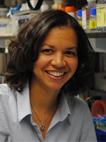Trusted Resources: People & Places
Healthcare providers, researchers, and advocates
Courtney Fitzhugh, MD
Researcher Clinical Researcher
National Heart, Lung, and Blood Institute
10 Center Dr
Bethesda, Maryland, United States
Courtney Fitzhugh received her B.S. magna cum laude from the University of California, Los Angeles in 1996, and her M.D. from the University of California, San Francisco in 2001. She is a member of the American Society of Hematology. Dr. Fitzhugh is exploring new avenues of hematopoietic stem cell (HSC) transplantation for sickle cell disease (SCD), while also studying the currently underexplored cardiovascular complications arising due to this genetic blood disorder. Dr. Fitzhugh is also conducting a half-matched protocol to increase the number of people eligible for HSC transplantation.
The current procedure requires a fully HLA-matched sibling donor, and less than 20% of SCD patients would qualify. Dr. Fitzhugh is examining why SCD patients develop heart disease, and what can be done to prevent or possibly even reverse heart-related complications in this population. Through these joint avenues of research, Dr. Fitzhugh’s group is finding new avenues to help people with SCD live longer and healthier lives. Dr. Fitzhugh is also interested in learning more about death due to this disease.
Representative Publications:
Losartan for the nephropathy of sickle cell anemia: A phase-2, multicenter trial
Allogeneic hematopoietic stem-cell transplantation for sickle cell disease
Curative approaches for sickle cell disease: A review of allogeneic and autologous strategies
Severe cardiac iron toxicity in two adults with sickle cell disease
Do the Eyes Reveal More Than Scleral Icterus in Sickle Cell Disease?
Related Content
-
Carlton Haywood, Jr., PhD, MABorn January 26, 1976, in Atlanta, Georg...
-
Wake Forest University Sickle Cell Center of ExcellenceWake Forest School of Medicine has serve...
-
Marina Cavazzana, MD, PhDMarina Cavazzana is a pediatrician, Prof...
-
Why do blood types matter? – Natalie S. Hodgehttps://www.youtube.com/watch?v=xfZhb6lm...
-
Healthcare Providers and Sickle Cell DiseaseSickle cell disease (SCD) is a group of ...
-
Foundation for Women & Girls with Blood DisordersIn 2010, the Foundation for Women & ...
-
Benign Hematologic Disorders in Children, an Issue of Pediatric Clinics of North America, Volume 65-3This issue will provide a current update...





 +myBinder
+myBinder
